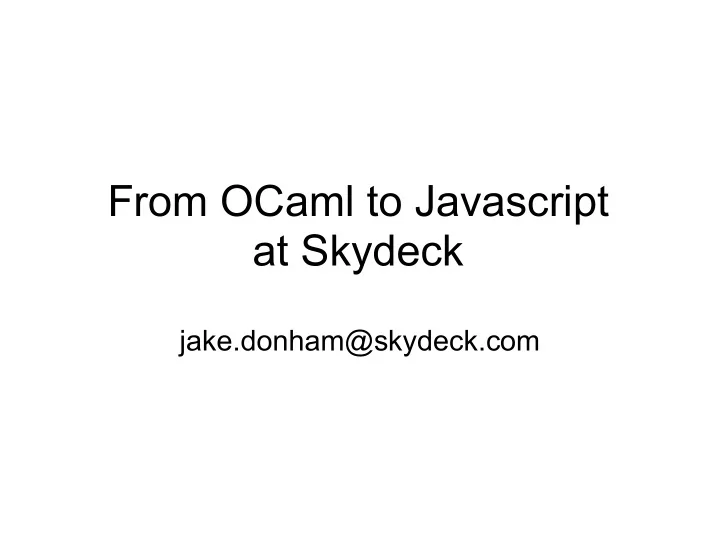

From OCaml to Javascript at Skydeck jake.donham@skydeck.com
What is Skydeck? a tool for managing your mobile phone reads your mobile phone call log presents it back to you in a useful way attach people to phone numbers view calls by person when did I last call Steve? who did I call yesterday? etc.
Where does the data come from? from your phone carrier's web site you give Skydeck your credentials we download bills and usage from carrier site with a Firefox extension with a standalone XULrunner app from our servers (a farm of XULrunners) via our web API 3rd party can add new data sources
Where does OCaml come into this? most of our system is written in OCaml bill parsing, web servers, etc. but the web is Javascript Mozilla apps are Javascript Javascript is not my favorite programming language too forgiving heavy syntax for functional code sad programmers
OCamljs we wrote OCamljs Javascript back-end for OCaml compiler wrote our Mozilla app in OCaml we are happy
Really? match referer with | None -> r#send body | Some re -> (* see http://developer.mozilla.org/en/docs/Setting_HTTP_req ... let os = XPCOM.getService_observer_service () in let observe (s : #XPCOM.supports) _ _ = let hc = s#_QueryInterface XPCOM.httpChannel in if hc == r#_get_channel#_QueryInterface XPCOM.httpChannel then hc#setRequestHeader "Referer" re false in let observer = Ocamljs.obj [ "observe", Ocamljs.jsfun3 observe ] in os#addObserver observer "http-on-modify-request" false; r#send body; os#removeObserver observer "http-on-modify-request";
Benefits of OCaml for downloader types types types can give types to the complicated Mozilla API continuation passing style enforced by types transparent RPC to server tool support (Camlp4, ocamlbuild)
How does OCamljs work? ocamlc compiles to "lambda" intermediate language ocamljs translates lambda to Javascript almost everything in the front-end comes for free type checking module system Camlp4 objects not free we want OCaml objects = JS objects
Example OCaml: module Test = struct type foo = Bar of int | Baz of bool | Quux let f = function | Bar i -> "Bar " ^ string_of_int i | Baz b -> "Baz " ^ (if b then "true" else "false") | Quux -> "Quux" end
module Test = Example struct type foo = Bar of int | Baz of bool | Quux let f = function | Bar i -> "Bar " ^ string_of_int i | Baz b -> "Baz " ^ (if b then "true" else "false") | Quux -> "Quux" end Lambda: (setglobal Test! (let (f/65 (function param/73 (switch* param/73 case int 0: "Quux" case tag 0: (apply (field 15 (global Pervasives!)) "Bar " (apply (field 19 (global Pervasives!)) (field 0 param/73))) case tag 1: (apply (field 15 (global Pervasives!)) "Baz " (if (field 0 param/73) "true" "false"))))) (makeblock 0 f/65)))
(setglobal Test! (let Example (f/65 (function param/73 (switch* param/73 case int 0: "Quux" case tag 0: (apply (field 15 (global Pervasives!)) "Bar " (apply (field 19 (global Pervasives!)) Javascript: (field 0 param/73))) case tag 1: (apply (field 15 (global Pervasives!)) "Baz " (if (field 0 param/73) "true" "false"))))) var oc$Test$ = (makeblock 0 f/65))) function () { var f$65 = _f(function (param$73) { if (typeof param$73 == "number") switch (param$73) { case 0: return "Quux"; default: return ... else switch ($t(param$73)) { case 0: return __(oc$Pervasives$[15], ["Bar ", _(oc$Pervasives$[19], [param$73[0]])]); case 1: return __(oc$Pervasives$[15], ["Baz ", param$73[0] ? "true" : "false"]); default: return null;} }); return $(f$65); }() ;
Gory details partial application / overapplication tail recursion via trampolines heap representation block -> array + tag int (nativeint, int32), float, char -> number bool -> number, bool since JS comparison ops return bool string -> string, number array support mutable strings
Interfacing with Javascript with "external" like with C naming convention for methods, accessors special externals for raw Javascript with object type naming convention for accessors OCamljs included libraries: some Mozilla API some built-in Javascript OCaml stdlib
Work in progress orpc for Javascript orpc generates RPC code from OCaml signatures works with Ocamlnet Javascript backend passes heap rep on client, just eval it on server, must check that it's valid for type jslib Camlp4 parser, pretty-printer, quotations for JS
Future work / dreams finish object support write Javascript objects in OCaml use jslib to support inline Javascript in OCaml code improve performance web programming like Google Web Toolkit
Using OCaml at a startup a good idea! better tools let you work faster static checking keeps you on course you get a clean slate you need to hire great people OCaml is fun!
Thanks! Skydeck is hiring http://skydeck.com/jobs http://code.google.com/p/ocamljs http://code.google.com/p/orpc2
Recommend
More recommend